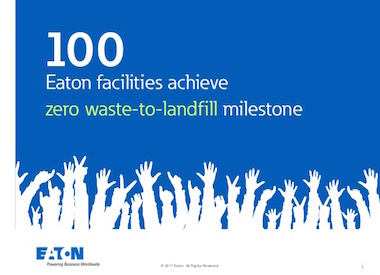Eaton Exceeds Waste Reduction Goals

Aug 20, 2018
Eaton has beaten its 2017 waste reduction goals by reducing its worldwide landfilled waste by 44%, keeping 1,098 metric tons of waste out of landfills.
As reported in a recently published sustainability report, 100 Eaton facilities worldwide have achieved zero waste-to-landfill milestone. This includes Eaton’s Mississauga, Ontario facility.
An Eaton facility is designated as a zero waste-to-landfill site when it consistently achieves a diversion rate of 98% through recycling, reuse, composting or incineration (when the heat generated is collected and used to create more energy than required for incineration).
In 2010, Eaton committed to reducing waste to landfill by 30%, indexed to sales, by 2015. The company significantly beat that goal through its zero waste-to-landfill program, which has engaged employees in sustainability and removed waste and greenhouse gases (GHG) from landfills in local communities. It also supports operational excellence and manufacturing efforts by focusing on redesigning processes to eliminate waste.
Eaton encourages its facilities to achieve zero waste-to-landfill as part of their waste management program and also as a means to reduce the release of GHG associated with landfills, especially methane, a GHG 20 times more potent than carbon dioxide.
Eaton facilities participating in zero waste-to-landfill
• emphasize source reduction by reducing the total amount of waste generated and, where possible, by removing waste streams entirely
• identify new suppliers, where possible, to divert remaining waste streams from a landfill. Zero-waste sites typically deploy a combination of recycling, re-use, composting and incineration (with energy recovery)
• engage employees to cultivate a culture where diverting waste from landfill is standard practice. Activities such as “dumpster dives,” suggestion boxes, games and prizes help to encourage participation
• capitalize on efficiencies of scale. Best practices are shared among sites in specific regions or with similar operations. In North America, for example, our waste management broker helps identify common solutions for all our sites in the region
Internal audits are conducted to ensure site compliance with the zero waste-to-landfill program benchmarks. Audits include validation of diversion rates, diversion methods and reported data.
All Eaton sites must manage waste responsibly in accordance with regulations and the company’s internal EHS Management (MESH) standards, including identifying all waste streams and creating waste minimization plans.











![Guide to the Canadian Electrical Code, Part 1[i], 26th Edition– A Road Map: Section 56](https://electricalindustry.ca/wp-content/uploads/2022/11/Guide-CE-Code-2.png)



